Impact investors will now be able to measure the social and environmental good achieved through their investments, thanks to a new framework developed by charity consultants NPC, working with US philanthropists Charly and Lisa Kleissner.
NPC’s Impact Assurance Classification is published today in their new report Investing for impact, which reviews the impact of the KL Felicitas Foundation (KLF) since 2004.
KLF was created by Charly and Lisa Kleissner, who earned their money in Silicon Valley and have committed 100% of their foundation’s $10m of assets to positive impact. This compares to an average of just 2% among other large US foundations involved in impact investment.
The framework classifies the investments in the KLF portfolio by the sophistication of the impact data available and the impact measurement carried out by each investee, focusing on the 41 investments to which impact is most integral. This pioneering system opens the way to compare social impact across investments, and enables analysts to assign each investment a status from stage one (where some data and metrics are available) to stage four (where positive social impact can be ascribed to that investment).
The Kleissners’ work pioneers a new approach to investment by committing their own assets and, by proving that social impact can be delivered alongside financial returns, encouraging others to follow suit.
This new system follows the ground-breaking publication of KLF’s financial performance by its investment advisor Sonen Capital in 2013, which confirmed the competitive financial returns possible from impact portfolio investing across all major asset classes. This has been followed this year by Cambridge Associates’ work around benchmarking financial returns of private equity impact investments.
Applying NPC’s Impact Assurance Classification to KLF’s portfolio, NPC found that KLF had, as one of many investors, invested in funds and organisations which achieved social impact including:
- the creation or support of 30,000 jobs in deprived areas of the US
- support for more than 400 small social and environmental businesses in the global south
- over $400m in affordable loans in under-banked areas of the US
- 360,000 acres of land protected or conserved in North and Central America
NPC also analysed the effectiveness of the Kleissners’ work to build an impact investment ‘movement’ through growing more effective investees and intermediaries, and through attracting more investors. Impact from this work to date includes:
- the creation of, or support for, impact investment intermediaries (such as first-time impact fund managers and impact advisory firms), raising more than $800m to date from 260 investors
- the creation of, or support for, investor networks with a total of 738 members, who have collectively committed $5.8bn assets to impact investing
- the creation of, or support for, 4 accelerators to build the capacity and impact of social enterprises, collectively reaching almost 700 social entrepreneurs
Lisa Kleissner, President and co-founder of KLF, said:
‘Proof of impact lies in our ability to measure it, and although in its infancy measuring is a must for dedicated impact investors like us.
‘The methods are imperfect, complex, and diverse. The numbers donʻt provide instant impact gratification. But data has meaning and an important story to tell. Understanding that narrative, for an impact investor, can be life changing.’
Plum Lomax, Deputy Director of the Funder Team at NPC and one of the authors of Investing for impact, said:
‘Impact investing is one of the most exciting new developments in making private capital work for the social good.
‘Hopefully this report shows how investors can start to sort the wheat from the chaff. Measuring and comparing the social impact of investments across a range of fields will always be a tricky task, but it’s also vital to helping the impact market grow and thrive. We are very proud to have worked with KLF on developing the right sort of framework for investors now, and one which will evolve to suit investors’ needs in the future’
Annachiara Marcandalli, Managing Director at global investment firm Cambridge Associates, said:
‘As interest in impact investing mounts, there has been greater emphasis placed on measuring the financial returns of impact investing funds, as well as the actual impact these funds produce. We’re delighted to see NPC publish this report on KLF’s portfolio, which is a concrete development toward a standardised framework for measuring impact.
‘With this report, NPC complements work that Cambridge Associates has done to benchmark the financial returns of social impact investments, and does a great service for the entire impact investing community’.
Sir Ronald Cohen, who was appointed by David Cameron to chair the UK’s Social Impact Investment Taskforce between 2013 and 2015, said:
‘Putting thinking about measurement into practice, NPC and the KL Felicitas Foundation deliver in this report valuable guidance on how to approach the measurement of a whole portfolio’s impact. Well done on another step forward’.
[Notes]
- The new report, Investing for impact: Practical tools, lessons, and results, is published by NPC on Thursday 5 November, and will formally be launched at an event in London, hosted by the global investment firm Cambridge Associates. From Thursday the report can also be downloaded from http://www.thinknpc.org/publications/investing-for-impact-practical-tools-lessons-and-results
- The 2013 report by Sonen Capital which demonstrates financial returns from KLF’s portfolio, Evolution of an impact portfolio, can be downloaded from https://www.sonencapital.com/thought-leadership-posts/evolution-of-an-impact-portfolio/ The 2015 report by Cambridge Associates into the financial returns potential in impact investing can be downloaded from http://www.cambridgeassociates.com/our-insights/research/introducing-the-impact-investing-benchmark/
- For more information, or to arrange an interview with Lisa Kleissner or NPC’s Plum Lomax, please contact NPC’s Media Manager, Russell Hargrave, on 07770 729557 or hargrave@thinknpc.org
- The mission of the KL Felicitas Foundation (KLF) is two-fold: to enable social entrepreneurs and enterprises worldwide to develop and grow sustainably and to advocate impact investing. It does this through aligning 100% of its assets with positive impact and building a movement for impact investing through financial and non-financial support. http://klfelicitasfoundation.org/
NPC (New Philanthropy Capital) is a charity think tank and consultancy which occupies a unique position at the nexus between charities and funders, helping them achieve the greatest impact. It is driven by the values and mission of the charity sector, to which it brings the rigour, clarity and analysis needed to better achieve the outcomes we all seek. It also shares the motivations and passion of funders, to which it brings its expertise, experi


